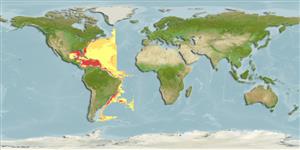>
Trachichthyiformes (Roughies) >
Trachichthyidae (Slimeheads)
Etymology: Hoplostethus: Greek, hoplon = weapon + Greek, stetho, stethion = brest; literal = to prick a little breast (Ref. 45335).
Environment: milieu / climate zone / depth range / distribution range
Ecologia
marinhas batipelágico; intervalo de profundidade 485 - 550 m (Ref. 9869). Deep-water
Atlantic Ocean: southern Nova Scotia south to the northern part of the Gulf of Mexico, on the eastern seaboard of Florida, in the Bahama, in the west and southern Caribbean, and around Venezuela, Guyana, Suriname, Tobago and Brazil.
Tamanho / Peso / Idade
Maturity: Lm ? range ? - ? cm
Max length : 17.3 cm SL macho/indeterminado; (Ref. 37108)
Espinhos dorsais (total) : 6; Raios dorsais (total) : 13; Espinhos anais: 3; Raios anais : 9. Pectoral fin long, its tip extending beyond anal fin origin (Ref. 13608). Scales adherent, spinules small, margins serrate, spines on fin rays small. Denticles on head bones small, septae relatively strong (Ref. 37108).
Ciclo de vida ou comportamento de acasalamento
Maturidade | Reprodução | Desova | Ovos | Fecundidade | Larvas
Kotlyar, A.N., 1986. Systematics and distribution of species of the genus Hoplostethus Cuvier (Beryciformes, Trachichthyidae). Trudy Inst. Okeanol. 121:97-140. (Ref. 9869)
Status na Lista Vermelha da UICN (Ref. 130435: Version 2024-2)
Ameaça para os humanos
Harmless
Uso pelos humanos
Pescarias: sem interesse
Ferramentas
Relatórios especiais
Baixar XML
Fontes da internet
Estimates based on models
Preferred temperature (Ref.
123201): 8.3 - 13.5, mean 9.4 °C (based on 21 cells).
Índice de diversidade filogenética (Ref.
82804): PD
50 = 0.5000 [Uniqueness, from 0.5 = low to 2.0 = high].
Bayesian length-weight: a=0.01660 (0.00714 - 0.03859), b=3.05 (2.85 - 3.25), in cm total length, based on LWR estimates for this (Sub)family-body shape (Ref.
93245).
Nível Trófico (Ref.
69278): 3.6 ±0.59 se; based on food items.
Resiliência (Ref.
120179): Muito baixo(a), tempo mínimo de duplicação da população maior que 14 anos (Preliminary K or Fecundity.).
Fishing Vulnerability (Ref.
59153): Low vulnerability (11 of 100).
